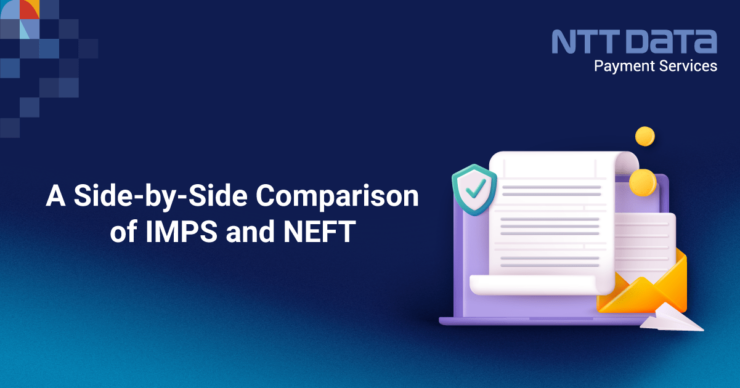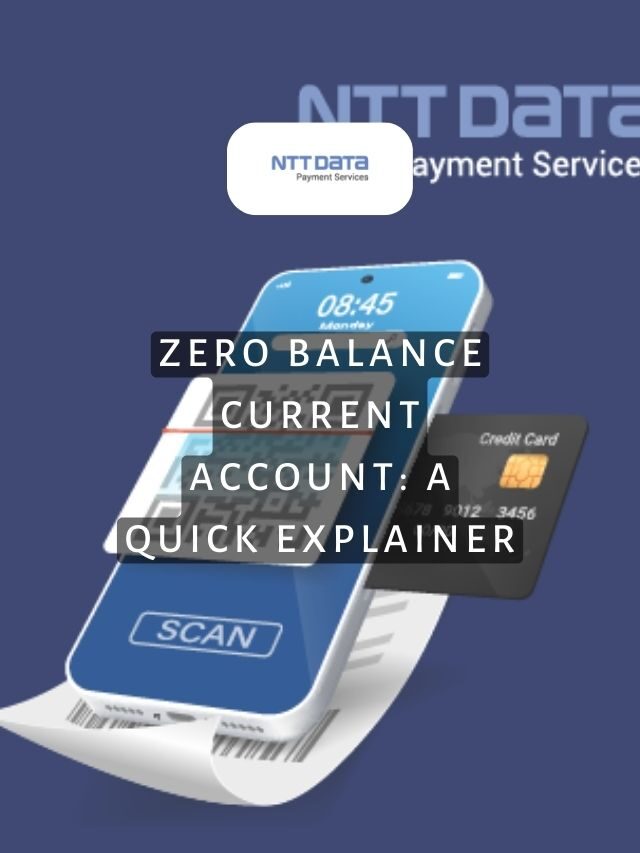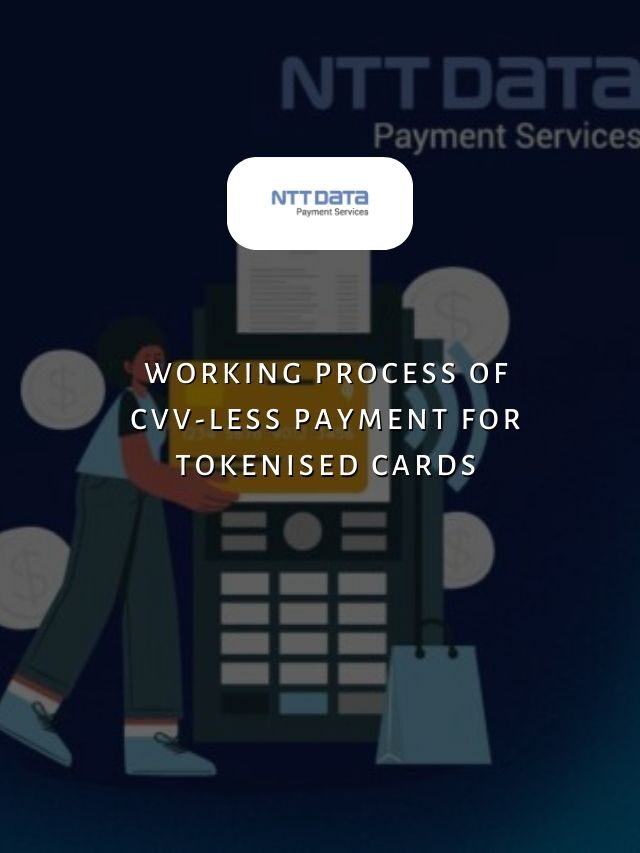
Table of Contents
- 1 What is IMPS?
- 2 How Does it Work?
- 3 Benefits of IMPS
- 4 What is NEFT?
- 5 How Does it Work?
- 6 Benefits of NEFT
- 7 A Side-by-Side Comparison of IMPS vs NEFT
- 8 IMPS or NEFT: Which One is the Better Choice?
- 9 Accept and Manage Payments Securely with NTT DATA Payment Services!
- 10 Conclusion
- 11 Frequently Asked Questions (FAQs)
India has witnessed a significant shift from cash-based transactions to digital payment methods in recent years. Electronic fund transfer methods have played a crucial role in this transition, making it easier and more convenient for individuals and businesses to send and receive money.
IMPS (Immediate Payment Service) and NEFT (National Electronic Funds Transfer) are two of the most popular digital payment methods in India. While both methods allow users to transfer money electronically, they differ in terms of processing time, transaction limits, fees, and more.
With the increasing popularity of these payment methods, it is essential to understand their similarities and differences to choose the one that best suits your needs.
In this blog, we will provide a side-by-side comparison of IMPS vs NEFT, helping you make an informed decision about which method to use for your digital payment needs.
What is IMPS?

IMPS stands for Immediate Payment Service, and it is a real-time interbank electronic fund transfer service in India. IMPS was launched in 2010 by the National Payments Corporation of India (NPCI) to provide a fast, secure, and efficient payment solution for users from anywhere in the country, using a mobile phone and an internet connection.
IMPS can be used to transfer funds 24/7, including weekends and bank holidays, and has a transaction limit of Rs. 5 lakhs per day.
How Does it Work?
Here’s how IMPS works,
- Customers must register with their bank for mobile banking to use IMPS. Additionally, you can also visit the bank’s website and sign up for the service by installing the bank’s mobile banking app.
- After signing up for mobile banking, the user can add the beneficiary’s account information, such as the account holder’s name, account number, and IFSC code.
- To initiate the transfer, the customer enters the amount they want to transfer and authorizes the transaction by entering an MPIN.
- If the customer approves the transaction, the funds are immediately sent to the beneficiary’s account. A confirmation SMS is sent to both the sender and the recipient of the message.
Benefits of IMPS
There are several advantages and disadvantages of IMPS payments that need to be considered before using them. Here are some major benefits,
- Real-time transfers: IMPS enables users to send money in real-time, so the recipient gets the money right away. It is therefore a quick and practical payment method.
- Availability: IMPS is a convenient payment option for urgent or emergency transactions as it is accessible around the clock, including on weekends and bank holidays.
- Secure: To validate the transaction and guarantee secure payments, IMPS uses two-factor authentication, which includes a mobile number and MPIN.
- Accessibility: Since IMPS is available to everyone with a mobile phone and a bank account, it is a common payment option for those who live in remote places with limited access to banks and other financial services.
Recent Web Stories
What is NEFT?

NEFT (National Electronic Funds Transfer) is a digital payment system in India that enables bank-to-bank electronic funds transfer on a one-to-one basis. It was introduced in 2005 by the Reserve Bank of India and has since become a popular method of online money transfer in India.
Unlike IMPS, fund transfers with NEFT don’t take place in real-time. You can transfer between 8:00 am and 7:30 pm on weekdays. No transfers are authorized on weekends or public holidays.
How Does it Work?
NEFT transactions are processed in batches, with settlement done hourly. The RBI operates NEFT on a deferred net settlement (DNS) basis, which means that transactions are processed in batches and settled at fixed times during the day.
The actual processing time may vary depending on the time of day, the volume of transactions, and other factors. Here’s how NEFT works,
- The sender must supply the recipient’s bank account number, name, and IFSC code of the recipient’s bank branch to start an NEFT transaction.
- The NEFT service center of the RBI receives the transaction details from the sender’s bank, including the money to be transferred and the recipient’s account information.
- The recipient’s bank subsequently receives the transaction details from the RBI and credits the funds to the recipient’s account.
- The sender’s bank notifies the sender of the successful transaction after receiving a confirmation message from the recipient’s bank.
Benefits of NEFT
Here are Some Benefits of NEFT,
- Wide Coverage: NEFT is a convenient choice for people who need to transfer money to a variety of banks and bank accounts as it is accessible at all bank branches in India.
- Minimal Fees: NEFT transactions typically have very low transaction fees, making it an affordable choice for online money transfers.
- Security: NEFT has a strong, multi-layered security system to safeguard users’ personal and financial information, making it a secure way to transfer money.
- Reliability: The NEFT mechanism is primarily coordinated by the Reserve Bank of India. As a result, this method is quite reliable.
A Side-by-Side Comparison of IMPS vs NEFT
| Factors | IMPS | NEFT |
| Regulatory body | IMPS is regulated by the National Payments Corporation of India (NPCI). | NEFT is regulated by the Reserve Bank of India (RBI). |
| Speed | IMPS transactions are processed in real time, which means that the funds are transferred immediately. | NEFT transactions, on the other hand, are processed in batches, with settlements done hourly. |
| Availability | IMPS is available 24×7, irrespective of banking hours and public holidays. | NEFT is available only during banking hours, i.e., from 8:00 am to 6:30 pm on weekdays and from 8:00 am to 12:00 pm on Saturdays. |
| Type of settlement | IMPS operates on an individual basis. | NEFT operates on a batch basis. |
| Transaction limit | The maximum limit for IMPS transactions is ₹5,00,000 per day. | There is no minimum or maximum transaction limit for NEFT. |
| Transaction fee | IMPS transactions are chargeable. The fees vary from bank to bank, ranging from ₹1- ₹25 for each transaction. | NEFT transactions incur no charges for online transactions. However, fees may apply for offline transactions. |
| Any restrictions | IMPS can be used to transfer funds to both individuals and businesses. | NEFT can be used only to transfer funds to individuals. |
Overall, both IMPS and NEFT are popular digital payment methods in India, with their own set of benefits and limitations.
IMPS or NEFT: Which One is the Better Choice?
IMPS and NEFT (National Electronic Fund Transfer) are both electronic payment systems used in India. While both are used to transfer funds from one bank account to another, there are clearly some key differences between the two.
IMPS is particularly helpful for small transactions and is perfect for sending and receiving money quickly and conveniently. The transaction fees for IMPS, however, are typically higher than those for NEFT.
On the other side, NEFT is a deferred net settlement-based electronic fund transfer service. Since NEFT transactions are processed in batches, there is a delay between when a transaction is started and when it is finished.
For larger transactions where the sender and receiver don’t need to transfer money right away, NEFT is a good choice.
So, which one is the better choice depends on your specific needs, such as the urgency of the transaction, the amount you wish to transfer, and the availability of the recipient’s bank account.
Accept and Manage Payments Securely with NTT DATA Payment Services!
The use of digital transactions in India has been growing rapidly in recent years. With the government’s push towards a cashless economy and the increase in digital payment options like IMPS, NEFT, and RTGS, more and more people are adopting online and mobile payment methods.
NTT DATA Payment Services offers a complete payment solution to advance both your offline and online businesses from,
- Online Payment Gateway
- POS machines
- IVR payments
- Mobile applications, and
- Bharat QR Scan and Pay
We ensure maximum comfort, convenience, and safety for all your payments.
Conclusion
In conclusion, both IMPS and NEFT are electronic fund transfer mechanisms that offer convenience and speed when it comes to sending and receiving money. However, they differ in terms of transaction limits, processing time, and availability.
Ultimately, the choice between IMPS and NEFT depends on your individual needs and preferences.
Regardless of which method you choose, both IMPS and NEFT are secure and reliable modes of electronic fund transfer that have made money transfers easier and more convenient than ever before!
| Also, you can get frequent updates on nttdatapayments Instagram page. |
Frequently Asked Questions (FAQs)
1. Which is better NEFT or IMPS?
Although IMPS has a transaction limit, it can be used for instant transfers. You can use NEFT to send larger amounts of money.
2. Is IMPS transfer free?
No, IMPS transfers incur a certain amount of fee. These fees vary from bank to bank, ranging from Re 1 to Rs 25 for each transaction.
3. What are the disadvantages of IMPS?
IMPS can be more expensive than other modes of fund transfer for larger transactions and may have network connectivity issues.
4. Is NEFT slower than IMPS?
Yes, IMPS transactions are faster than NEFT as they happen in real time, meaning they take place immediately. However, NEFT transactions take a few hours.
5. Is NEFT free or chargeable?
NEFT transactions are completely free of charge.







